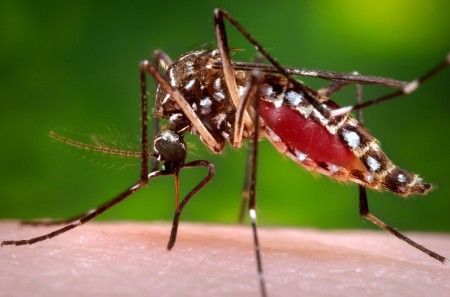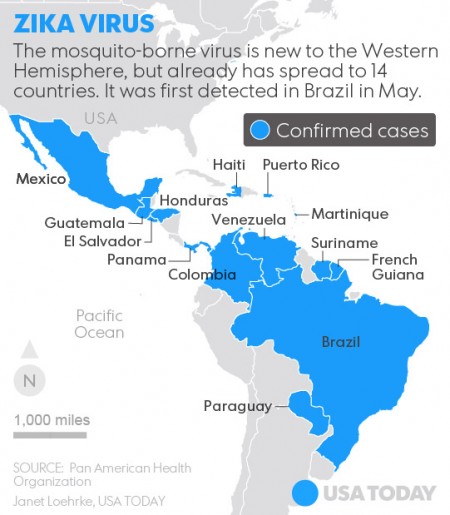February 5, 2016 – The Zika virus has emerged to become a worldwide problem according to the World Health Organization in announcements made in the last week. First discovered in 1947 in Uganda in an infected monkey, the disease was largely a footnote in medical journals with 80% of those testing positive for the virus showing no symptoms, and the remaining 20% experiencing mild illness lasting a few days. Outbreaks sporadically appeared in Asia and Africa and then starting in first decade of the 21st century in Pacific Ocean island nations.
Now Zika is being described as a “public health emergency of international concern,” and is just one of a number of diseases passed on to humans through the Aedes aegypti mosquito, also associated with Dengue and Chikungunya, two other viral threats transmitted by this insect to humans.
In Brazil the Zika virus is correlated to a sudden increase in the number of babies born with microcephaly, a congenital malformation producing fetuses with smaller than normal heads and brains. Since 2014 the Brazilian government has reported more than 4,000 suspected cases with 147 confirmed. Brazil is said to be under reporting the extent of the disease and now it is spreading to other South American countries, Central America, the Caribbean and the United States.
Wherever the mosquito is found Zika presents a threat. To make matters worse, it appears that Aedes aegypti is not the sole carrier. Aedes albopictus, a more temperate zone mosquito appears to be harboring the virus which means the disease is becoming more than a tropical and subtropical threat.
Brazil has been attempting to eradicate the mosquito through controlled spraying of insecticides. Yet the country has a solution that it has yet to release that would be far more effective. It is genetically engineered male mosquitoes developed by Oxitec, a leading-edge company GMO from the United Kingdom. If its gene-altered mosquitoes were released into the wild they would ensure that the progeny of the female Aedes aegypti population would yield dead offspring before becoming an adult-biting population. Released GMO males would pose no threat to animal or human populations because males do not bite. Hence the technology is self-limiting.
Brazil has tested Oxitec mosquitoes in a limited number of controlled releases. Tests have been highly successful in reducing populationa of female biting mosquitoes. Yet despite these local successes the government continues to drag its feet in approving a wider release. There are even hints that the Zika epidemic was caused by GMO mosquitoes which is an absurdity since the GMO males do not bite. But such is the fear of GMO concocted by conspiracy theorists that a beneficial strategy to control the epidemic gets suborned and delayed.
If Oxitec were given the green light not only would the world community have a solution to eliminate Zika, but also Dengue and Chikungunya.
So what’s stopping us?
The fear of unintended consequences from using GMO. Even though the Oxitec technology is engineered to be self-limiting, bound within the insect’s DNA impacting reproductive capacity, the spreaders of FUD (fear, uncertainty and doubt) continue to cause regulators to hesitate.
And what is their biggest concern?
The potential impact of GMO mosquitoes on animals that feed on them. But in the more than two decades since GMO technology first emerged, there is no evidence that eating any DNA modified plants or animals, including mosquitoes, produces any deleterious effects on the eater or his or her descendants.
For the Brazilian government, therefore, there seems to be no excuse not to proceed with large releases of Oxitec GMO mosquitoes, a much preferred solution when compared with the spraying of pesticides which have far more unintended consequecnes.
And for other nations facing the same Zika challenge, introducing Oxitec trials should be expedited. In the 21st century we have the means to end these disease threats through technological solutions. So what are we waiting for?




















[…] Zika and a GMO Solution […]
[…] Zika and a GMO Solution […]